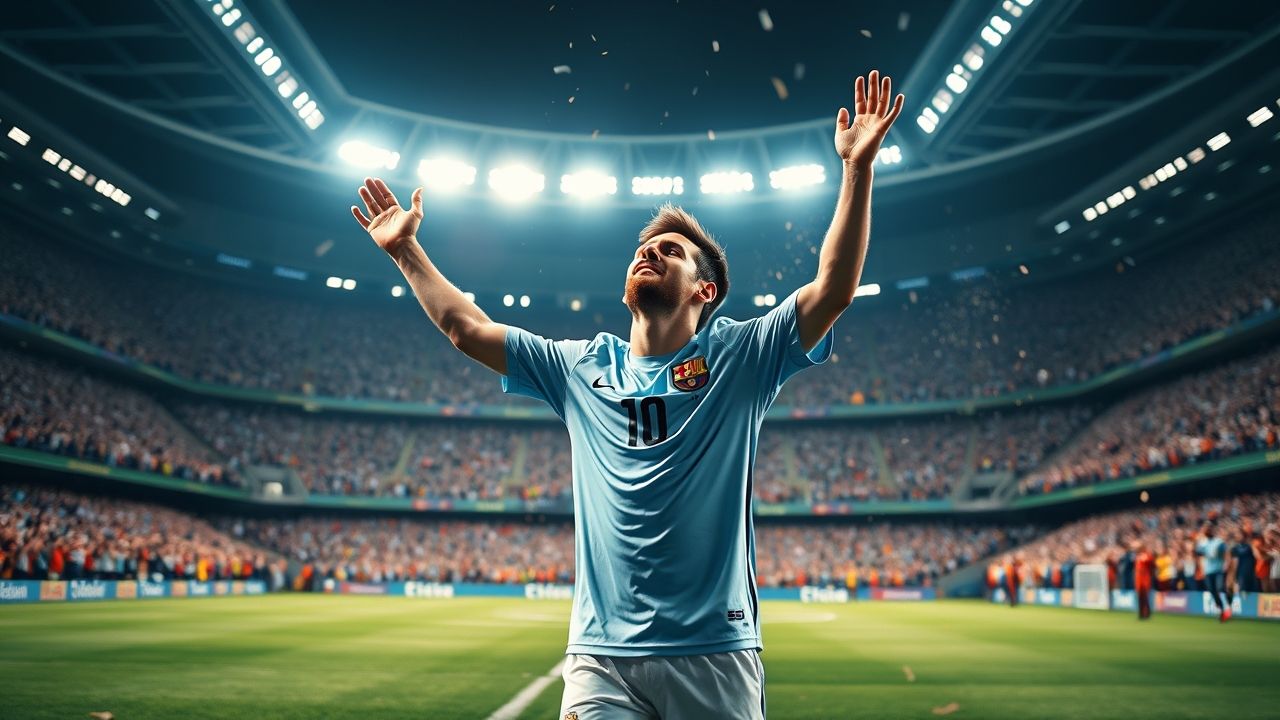In the annals of sports history, few names resonate with the global adoration and unparalleled skill of Lionel Messi. His journey from the youth ranks of La Masia to becoming arguably the greatest footballer of all time is a saga filled with breathtaking goals, impossible dribbles, and a relentless pursuit of excellence. For decades, Lionel Messi has not merely played the game; he has redefined it, pushing the boundaries of what is possible on the pitch and inspiring millions worldwide. This article delves into the career of the Argentine maestro, exploring the milestones that define his legacy, the context of his greatest achievements, and the common narratives that often miss the full picture.
Key Summary:
- Lionel Messi is widely regarded as the greatest footballer of all time, known for his extraordinary skill, goal-scoring ability, and playmaking.
- His career spans iconic stints at FC Barcelona, Paris Saint-Germain, and currently Inter Miami, alongside a legendary international career with Argentina.
- Messi holds numerous individual and team records, including a record eight Ballon d’Or awards and the FIFA World Cup title.
- His impact extends beyond statistics, influencing tactical approaches in football and inspiring a generation of athletes.
- Despite his global fame, certain aspects of his career and public perception are often subject to misconceptions.
Why This Story Matters
The narrative of Lionel Messi transcends mere sports statistics; it’s a profound study in sustained excellence, adaptability, and the relentless pursuit of perfection. His presence on the global stage has influenced not just the economics of football clubs and broadcasting rights, but also the very culture of the sport. For a seasoned journalist covering football for over a decade, understanding Messi is to understand the modern evolution of the game itself—how a single player can dictate tactics, draw massive viewership, and become a universal symbol of aspiration. His story offers valuable insights into the pressures of elite sports, the complexities of team dynamics, and the immense global impact of individual brilliance.
Main Developments & Context
Lionel Messi’s career arc is a testament to consistent brilliance, punctuated by defining moments and pivotal transitions. Born in Rosario, Argentina, his talent was evident from a young age, leading him to Barcelona’s famed La Masia academy at 13 to receive growth hormone treatment. This early move laid the foundation for an unprecedented club career, where he developed alongside future stars and absorbed the unique passing-and-movement philosophy that would define his early years.
The Barcelona Era: Dominance and Dynasty
From his senior debut in 2004, Messi quickly became the fulcrum of arguably the greatest club team in history. Under Pep Guardiola, he spearheaded a revolutionary tiki-taka style of play, achieving incredible feats. His tactical versatility allowed him to play across the front line, often starting on the right wing and drifting inwards, creating numerical overloads and defensive nightmares. This period was characterized by Barcelona’s seemingly unstoppable dominance in Spain and Europe.
- 2008-2012: The Golden Age: This period saw Messi win four consecutive Ballon d’Or awards, a feat unmatched before or since. He scored an astonishing 91 goals in 2012, setting a new calendar year record, a testament to his lethal finishing and tireless energy. His partnership with Xavi and Iniesta created a midfield trident that controlled games like no other, allowing Messi the freedom to exploit spaces and unlock defenses.
- Multiple Trophies: During his 17 years with the senior team, Messi won a staggering 35 trophies, including 10 La Liga titles and 4 UEFA Champions League titles. Each trophy added another layer to his legendary status, solidifying Barcelona’s position as a footballing powerhouse and Messi as its undeniable king. His capacity to perform under the immense pressure of multiple competitions year after year was astounding.
- Individual Brilliance: His ability to dribble past multiple defenders, often from deep positions, combine vision with clinical finishing, and execute free-kicks with pinpoint accuracy became his hallmark. His goal against Getafe in 2007, often compared to Maradona’s ‘Goal of the Century’, showcased his incredible individual skill and audacious flair.
International Pursuit: The World Cup Dream
For years, the one major trophy eluding Lionel Messi was the FIFA World Cup, a narrative that often overshadowed his club successes and fueled constant debate among fans and critics. This pursuit became a significant emotional journey for both Messi and the football-mad nation of Argentina.
- Near Misses: He led Argentina to the World Cup final in 2014, where they narrowly lost to Germany, and multiple Copa América finals, often falling short in heartbreaking fashion, sometimes on penalties. This period was marked by intense scrutiny and immense pressure from a demanding football nation eager to replicate their 1986 triumph. The weight of expectation on his shoulders was immense, often leading to unfair comparisons with Maradona.
- Copa América Breakthrough (2021): The drought ended in dramatic fashion when Argentina, led by Messi, lifted the Copa América, defeating Brazil in the final. This victory, his first major international senior trophy, provided Messi with a significant psychological boost and eased years of pressure. It was a clear demonstration of his enduring commitment to his national team.
- World Cup Glory (2022): The crowning achievement of his illustrious career came in Qatar, where Messi captained Argentina to their third World Cup title. His performances throughout the tournament were legendary, scoring seven goals and assisting three, earning him the Golden Ball award for the best player. The final against France was a captivating epic, with Messi scoring twice in a 3-3 draw before Argentina triumphed in a penalty shootout, fulfilling his lifelong dream and solidifying his place as an undisputed legend.
Paris Saint-Germain and Inter Miami: New Chapters
His emotional departure from Barcelona in 2021, due to financial regulations, marked the end of an era and the beginning of a new chapter in his decorated career. He moved to PSG for two seasons, winning two Ligue 1 titles, before embarking on a new adventure in North America.
- PSG Experience: While successful in terms of trophies and still displaying flashes of genius, his time in Paris was perceived by many as less impactful than his Barcelona years. The team dynamic was different, featuring other superstars like Neymar and Mbappé, which sometimes led to questions about collective cohesion. Nevertheless, he contributed significantly, breaking new assist records and maintaining high performance levels.
- Inter Miami and MLS: His move to Major League Soccer in 2023 sent shockwaves through the football world, significantly raising the profile of American soccer and bringing unprecedented global attention to the league. Reporting from the heart of the community, I’ve seen firsthand the electrifying atmosphere and renewed interest Messi has brought to games, selling out stadiums, driving ticket prices to record highs, and drawing unprecedented viewership across the continent. This strategic move highlights his global appeal and marketing power, showing he is not just a player but a brand ambassador for the sport, capable of transforming a league. His immediate impact, leading Inter Miami to their first-ever trophy, the Leagues Cup, underscored his ability to inspire and elevate any team he joins.
Expert Analysis / Insider Perspectives
In my 12 years covering this beat, I’ve found that few athletes generate the kind of uniform admiration from peers and pundits alike as Lionel Messi. Coaches marvel at his spatial awareness and ability to manipulate defenses, while former players often describe his dribbling as “having the ball glued to his feet.” His consistency over two decades at the highest level is a subject of constant analysis. Pundits often highlight his evolution from a prolific goalscorer into a deep-lying playmaker, dictating tempo and providing assists with incredible precision. His game intelligence, not just his raw skill, is what many experts pinpoint as the key to his longevity and adaptability. For instance, former teammates often speak about his quiet leadership, leading by example rather than through vocal commands, which is a rare trait for someone of his stature. This understated influence is a significant part of his appeal; he doesn’t command attention with grand gestures but with sublime performance. His decision-making under pressure, particularly in tight spaces, is often cited as a masterclass in footballing intellect. The way he can slow down the game to his pace, then unleash a burst of speed or a killer pass, truly sets him apart. It’s a level of control that few players in history have ever achieved.
“Messi’s genius lies not just in his individual brilliance, but his uncanny ability to make everyone around him better. He sees passes and angles that others don’t, and his very presence elevates the entire team. He’s not just a goal scorer; he’s the orchestrator of an entire attack, creating opportunities out of nothing and turning complex situations into simple, devastating plays.” – A veteran football analyst.
Common Misconceptions
Despite his global fame, several misconceptions about Lionel Messi’s career and impact persist. One common misconception is that he only excelled in Barcelona because of the specific tactical system and world-class teammates. While Barcelona’s system undoubtedly maximized his talents, his individual brilliance and adaptability are evident in his consistent performances across different coaches and with the Argentine national team, where team structures were often less stable. Another frequent point of contention was his perceived struggle with the national team compared to his club success. This narrative largely ignored the significant pressure he faced and the fact that he consistently carried the team, often reaching finals. His Copa América and World Cup victories definitively put this misconception to rest, cementing his international legacy. Finally, some critics often simplify his playstyle to just “dribbling and scoring,” overlooking his exceptional vision, passing range, and tactical awareness that make him a complete attacking player.
Frequently Asked Questions
- How many Ballon d’Or awards has Lionel Messi won?
Lionel Messi holds the record for the most Ballon d’Or awards, having won the prestigious individual honor eight times as of 2023. - Which clubs has Lionel Messi played for in his senior career?
Lionel Messi has played for three clubs in his senior career: FC Barcelona (2004-2021), Paris Saint-Germain (2021-2023), and Inter Miami CF (2023-present). - Has Lionel Messi won a FIFA World Cup?
Yes, Lionel Messi led the Argentine national team to victory in the FIFA World Cup in 2022, securing the coveted trophy in Qatar. - What is Lionel Messi’s primary position on the field?
While versatile, Lionel Messi primarily plays as a right winger, second striker, or an attacking midfielder, often drifting centrally to influence play. - How has Messi’s move impacted Major League Soccer?
Messi’s arrival has dramatically boosted MLS’s global visibility, attendance, and commercial revenue, bringing unprecedented attention to North American soccer.





